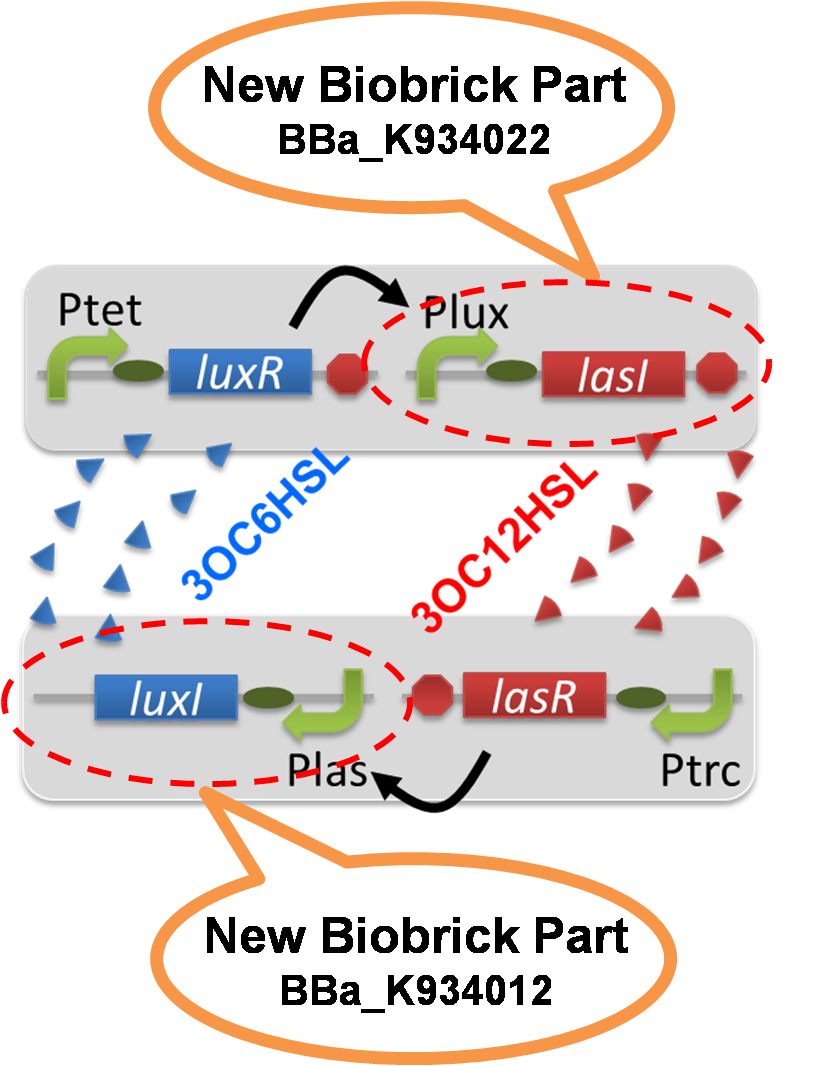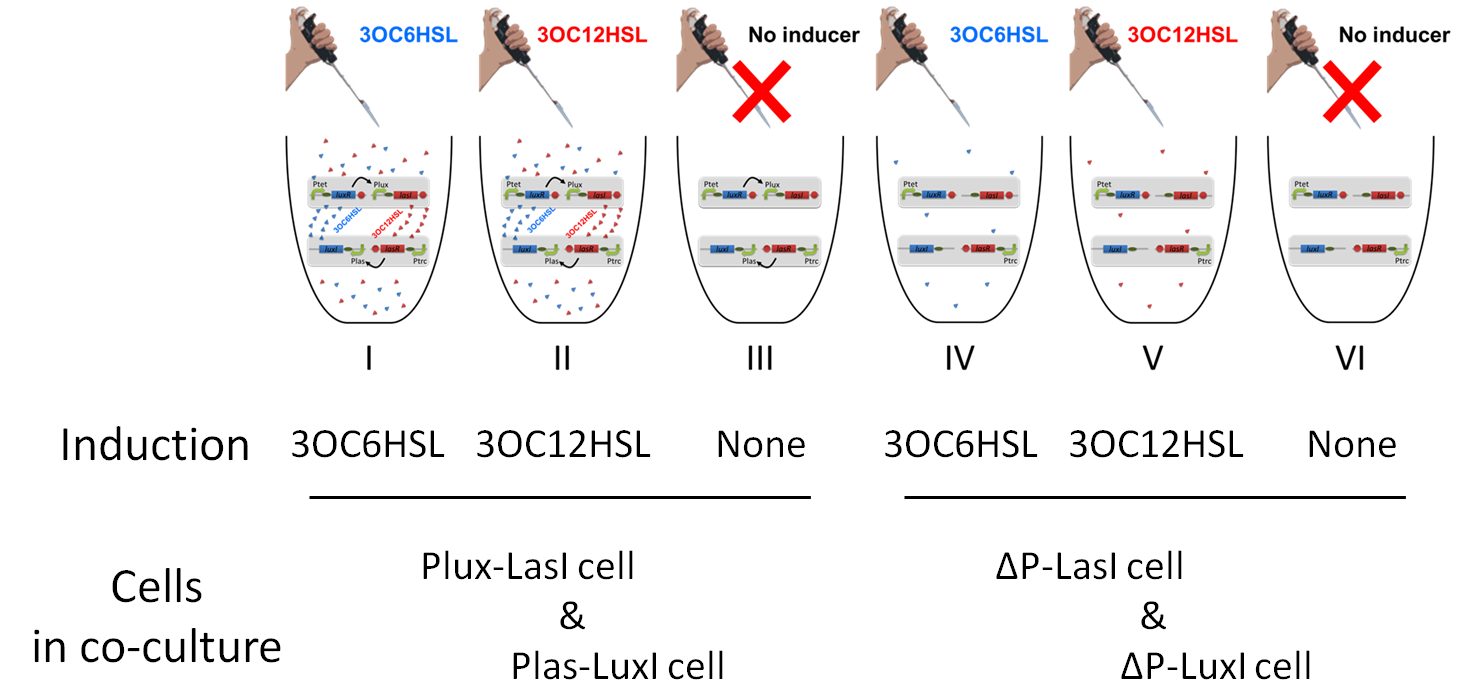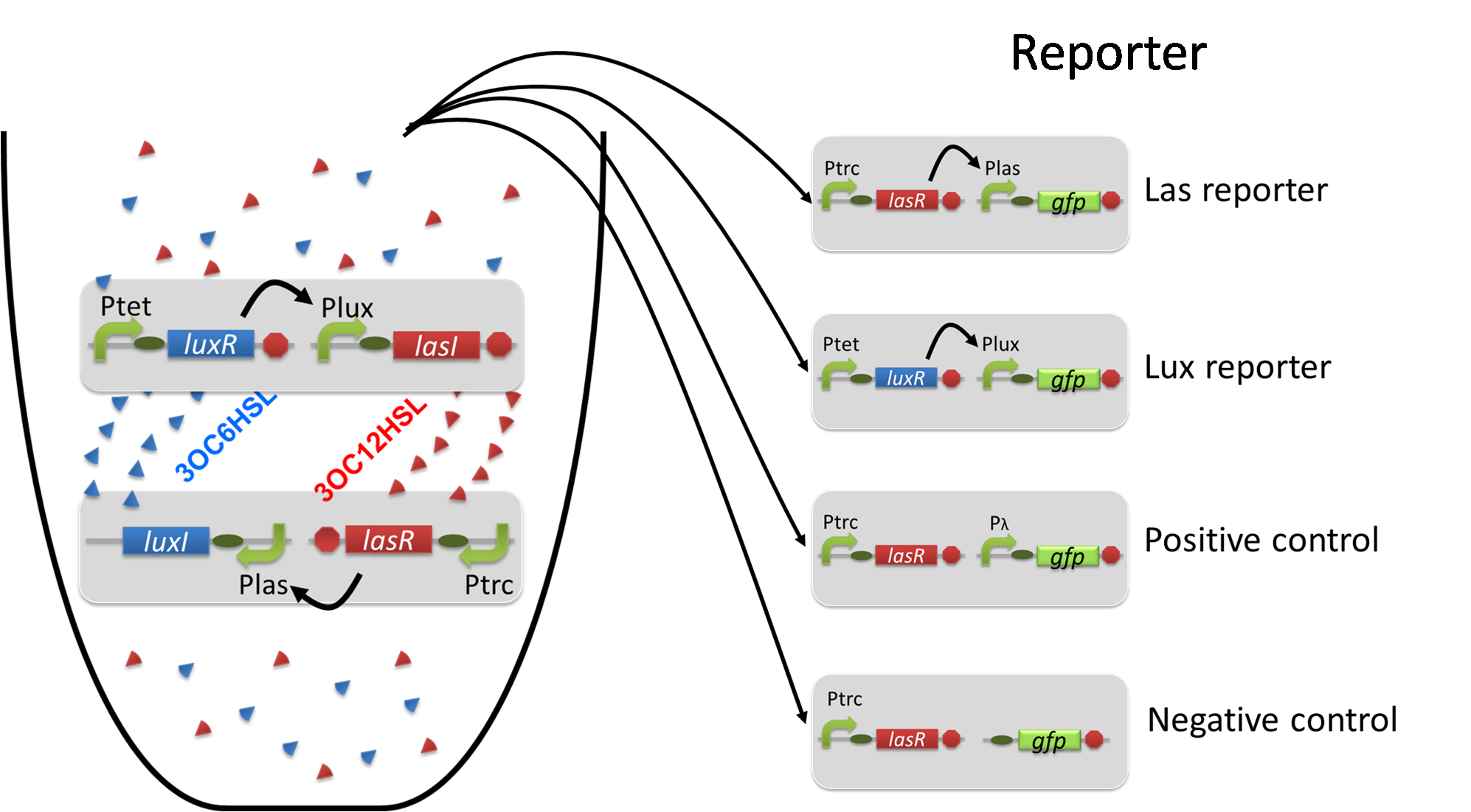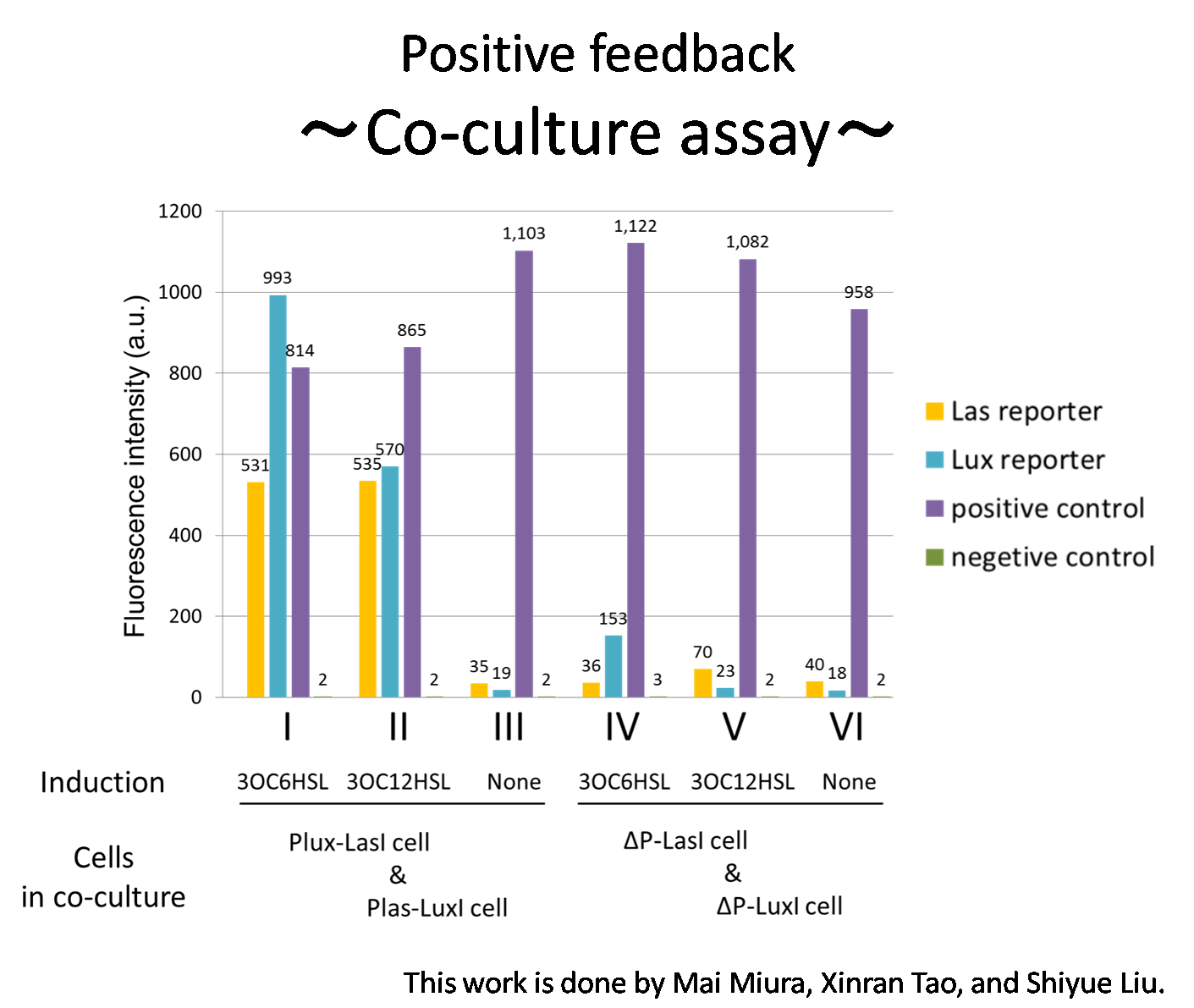Team:Tokyo Tech/Experiment/positivefeedback1
From 2012.igem.org
(Created page with "{{tokyotechcss}} {{tokyotechmenubar}} <br><br> <div class="whitebox"> =Construction of the 3OC12HSL-dependent 3OC6HSL production module=") |
|||
| Line 4: | Line 4: | ||
<div class="whitebox"> | <div class="whitebox"> | ||
| - | =Construction of the 3OC12HSL- | + | =Construction of the positive feedback system= |
| + | [[File:positivefeedbackassay17tokyotech.png|150px|thumb|right|Fig2-1-3-1-1, Positive feedback system in the cell-cell communication]] | ||
| + | |||
| + | To accomplish complete positive feedback system, we mixed and co-cultured Plux-LasI cell and Plas-LuxI cell (Fig2-1-3-1-1). As a control co-culture, ⊿P-LasI cell and ⊿P-LuxI cell were mixed. For a trigger of the positive feedback system, we added the initial does of 3OC6HSL (5nM) or 3OC12HSL (2.5nM) to the co-cultures. Including no-induction controls, we thus prepared six conditions (Fig2-1-3-1-8). To confirm that both 3OC6HSL and 3OC12HSL are produced in the positive feedback, the signals content in the supernatants of the co-cultures were evaluated by Las reporter strain and Lux reporter strain (Fig2-1-3-1-9). | ||
| + | <br><br><br><br><br><br><br> | ||
| + | [[File:positivefeedbackassay27tokyotech.png|350px|thumb|left|Fig2-1-3-1-8, Six conditions prepared for positive feedback assay | ||
| + | ]] | ||
| + | [[File:positivefeedbackassay28tokyotech.png|350px|thumb|left|Fig2-1-3-1-9, How to evaluate the positive feedback | ||
| + | ]] | ||
| + | <br><br><br><br><br><br><br><br><br><br><br><br><br> | ||
| + | In these co-cultures, following behavior would be expected. In the condition I, 3OC6HSL induces 3OC12HSL production of Plux-LasI cell. Then, 3OC12HSL synthesized by Plux-LasI cell induces Plas-LuxI cell. The concentration of 3OC6HSL thus increases compared to the initial amount. Increased amount of 3OC6HSL induces higher production of 3OC12HSL. As a result, the production of both signals increased in the condition I. In this situation, the concentration of 3OC6HSL is higher than the initial concentration of 3OC6HSL (ideal positive feedback behavior). Similarly in the condition II, total amount of 3OC12HSL also increases compared to the initial amount. In the conditions III and VI, no signal is produced because of the lack of inducer. In conditions IV and V, little amount of 3OC6HSL and 3OC12HSL are remained without degradation, respectively. | ||
| + | |||
| + | [[File:positivefeedbackassay31tokyotech.png|450px|thumb|right|Fig2-1-3-1-10, Positive feedback assay | ||
| + | ]] | ||
| + | <br><br><br> | ||
| + | Fig2-1-3-1-10 shows that the fluorescence intensity of the Lux reporter cell in the condition I was higher than that in the condition IV. Similarly, the fluorescence intensity of the Las reporter in the condition II was higher than that in the condition V. | ||
| + | From these results and circuit design described above, it is suggested that the appearance of positive feedback where cooperation of Plas-LuxI cell and Plux-LasI cell increase the production of 3OC6HSL and 3OC12HSL. [[https://2012.igem.org/Team:Tokyo_Tech/Projects/positive_feedback_assay/index.htm#positive_feedback_assay Protocol]] | ||
| + | <br><br><br><br><br> | ||
Revision as of 06:20, 13 October 2012
Construction of the positive feedback system
To accomplish complete positive feedback system, we mixed and co-cultured Plux-LasI cell and Plas-LuxI cell (Fig2-1-3-1-1). As a control co-culture, ⊿P-LasI cell and ⊿P-LuxI cell were mixed. For a trigger of the positive feedback system, we added the initial does of 3OC6HSL (5nM) or 3OC12HSL (2.5nM) to the co-cultures. Including no-induction controls, we thus prepared six conditions (Fig2-1-3-1-8). To confirm that both 3OC6HSL and 3OC12HSL are produced in the positive feedback, the signals content in the supernatants of the co-cultures were evaluated by Las reporter strain and Lux reporter strain (Fig2-1-3-1-9).
In these co-cultures, following behavior would be expected. In the condition I, 3OC6HSL induces 3OC12HSL production of Plux-LasI cell. Then, 3OC12HSL synthesized by Plux-LasI cell induces Plas-LuxI cell. The concentration of 3OC6HSL thus increases compared to the initial amount. Increased amount of 3OC6HSL induces higher production of 3OC12HSL. As a result, the production of both signals increased in the condition I. In this situation, the concentration of 3OC6HSL is higher than the initial concentration of 3OC6HSL (ideal positive feedback behavior). Similarly in the condition II, total amount of 3OC12HSL also increases compared to the initial amount. In the conditions III and VI, no signal is produced because of the lack of inducer. In conditions IV and V, little amount of 3OC6HSL and 3OC12HSL are remained without degradation, respectively.
Fig2-1-3-1-10 shows that the fluorescence intensity of the Lux reporter cell in the condition I was higher than that in the condition IV. Similarly, the fluorescence intensity of the Las reporter in the condition II was higher than that in the condition V.
From these results and circuit design described above, it is suggested that the appearance of positive feedback where cooperation of Plas-LuxI cell and Plux-LasI cell increase the production of 3OC6HSL and 3OC12HSL. [Protocol]
 "
"



